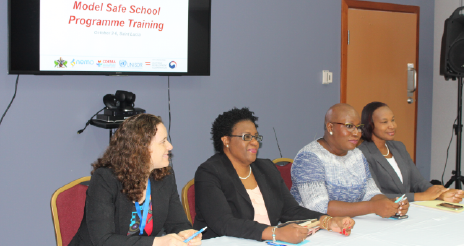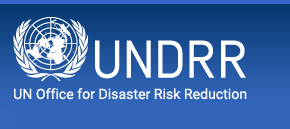- Our Mandate
- Mission and Objectives
- UNDRR in the UN
- Work Programme & Annual Reports
- Results Based System
- Work Partnerships
- Headquarters - Geneva
- SG-UN representatives for DRR
- Regional Office – The Americas and the Caribbean
- Head of the Regional Office – The Americas and the Caribbean
- What is Disaster Risk Reduction?
- What is the International Strategy?
- History of UNDRR
Saint Lucia steps up for School Safety

By UNDRR The Americas
Saint Lucia, Thursday, October 5th 2017 – The devastation to public facilities and schools in the region during this Hurricane season has raised awareness on the need to accomplish school safety as integral part of disaster risk reduction policies at regional and national level. In order to enhance school safety, representatives from Ministry of Education, Innovation, Gender Relations and Sustainable Development, the Ministry of Infrastructure, the National Disaster Management Office (NEMO) as well as Principles and Teachers from different schools in Saint Lucia attend a workshop training from 3 to 6 October in Castries to learn how to apply the Model Safe School Programme (MSSP).
Saint Lucia is a Small Island Developing State (SIDS) located within the Lesser Antillean Arc of the Caribbean Archipelago, and situated on a volcanic ridge that is characterized by steep, rugged landscapes with deep valleys and fast flowing rivers. The combination of the steep topography and young volcanic soils, constantly subjected to seasonal high rainfall, makes the island very susceptible to soil erosion.
Saint Lucia is the first country in which the tool MSSP will be used with the objective to conduct school vulnerability assessments aiming at identifying priorities to strengthen schools safety which shall inform planning and investment decision. Hon. Dr. Gale T.C. Rigobert, the Minister of Education, Innovation, Gender Relations and Sustainable Development highlighted that school safety is a high priority for the Ministry. She referred to the need to include school safety activities such as proactive maintenance into the national budget.
Mrs. Velda Joseph, the Director of NEMO, added that it is critical to develop relevant policies such as, for example, maintenance policy to guide decision-making on investment. She further suggested that Saint Lucia becomes a Safe School Leader of the Worldwide Initiative for Safe Schools (WISS) which is a government-led global partnership for advancing safe school implementation.
The Permanent Secretary of the Department of Education, Innovation and Gender Relations, Mrs. Allison Jean, emphasized the need of having a sectoral approach to school safety ministries such as the Ministry of Education, the Ministry of Infrastructure, and the ministry of Finance and Planning in the engagement of the process.
The MSSP, endorsed by the Caribbean Disaster Emergency Management Agency (CDEMA) Council in 2015, is designed to assist CDEMA Participating States with implementing processes that result in safer and greener educational facilities.
The schools participating in this training will benefit greatly, as using the safety standards and the application of the assessment tools will provide Ministries and schools with a means of understanding the anatomy of the risk they face, thus enabling them to make fact-based decisions on the design and implementation of programmes to increase the resilience of school. The information generated by the application of the assessment tools will allow for flexible action planning across various times scales (short, medium and long-term) considering the available resources and other unique characteristics of the implementing country.
This activity contributes to the implementation of the Caribbean Road Map for School Safety, which guides the Caribbean Safe School and was launched on April 2017 during the Caribbean Safe School Ministerial Forum. The training will be replicated in other Caribbean countries and is part of an initiative jointly implemented by UNDRR and CDEMA thanks to the financial support of the Austrian Development Agency (ADA) and the Government of Korea.
Related links:
Saint Lucia Country Document
Comprehensive School Safety (CSS) Framework
Worldwide Initiative for Safe Schools (WISS)
Model Safe School Programme MSSP
Caribbean Road Map for School Safety
Caribbean Safe School Ministerial Forum
Follow the UNDRR news online :
 Now we have twitter account @UNDRR Américas y el Caribe
Now we have twitter account @UNDRR Américas y el Caribe
JOIN US!
Tweets por el @UNDRR Américas y el Caribe
